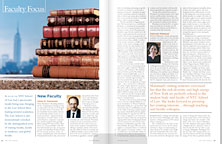Allen and Franck Elected to the American Academy of Arts and Sciences
Printer Friendly VersionTwo NYU School of Law professors, William Allen and Thomas Franck, were elected fellows of the American Academy of Arts and Sciences. This highly prestigious honors society recognizes those who have achieved great distinction in their fields.
Allen, the Nusbaum Professor of Law and Business and director of the Center for Law and Business, came to NYU in 1997, following 12 years as chancellor of the Court of Chancery in Delaware, widely considered the leading U.S. trial court for questions of business and corporation law. At the University, Allen is on the Law School faculty and a clinical professor of business in the Finance Department of the Stern School of Business.
Franck, the Murry and Ida Becker Professor of Law Emeritus, is a leader in the field of international law and formerly the director of the Center for International Studies. Franck has acted as legal advisor or counsel to many foreign governments, including Kenya, El Salvador, and Bosnia and Herzegovina. As an advocate before the International Court of Justice, he has successfully represented Chad and is currently representing Bosnia in a suit brought against Serbia under the Genocide Convention. From 1986 to 1993, he served on the U.S. Department of State Advisory Committee on International Law. He is the author of more than 20 books, most recently The Empowered Self: Law and Society in the Age of Individualism (Oxford University Press, 1999), and is a two-time Guggenheim Fellowship winner.
“Election to the American Academy is an honor that acknowledges the best of all scholarly fields and professions. Newly elected fellows are selected through a highly competitive process that recognizes those who have made preeminent contributions to their disciplines,” said Academy President Patricia Meyer Spacks.
Allen and Franck join several Law School faculty who have been elected to the academy over the years: Anthony Amsterdam; Jerome Bruner; Jerome Cohen; Norman Dorsen; Ronald Dworkin; Stephen Holmes; Thomas Nagel; Burt Neuborne; John Reid; John Sexton; Richard Stewart; and Joseph Weiler.
The academy was founded in 1780 by John Adams, James Bowdoin, John Hancock, and other scholar-patriots “to cultivate every art and science which may tend to advance the interest, honor, dignity, and happiness of a free, independent, and virtuous people.” The academy has elected as fellows the finest minds and most influential leaders from each generation, including George Washington and Ben Franklin in the 18th century, Daniel Webster and Ralph Waldo Emerson in the 19th, and Albert Einstein and Winston Churchill in the 20th. The current membership includes more than 150 Nobel laureates and 50 Pulitzer Prize winners.

 Multimedia
Multimedia